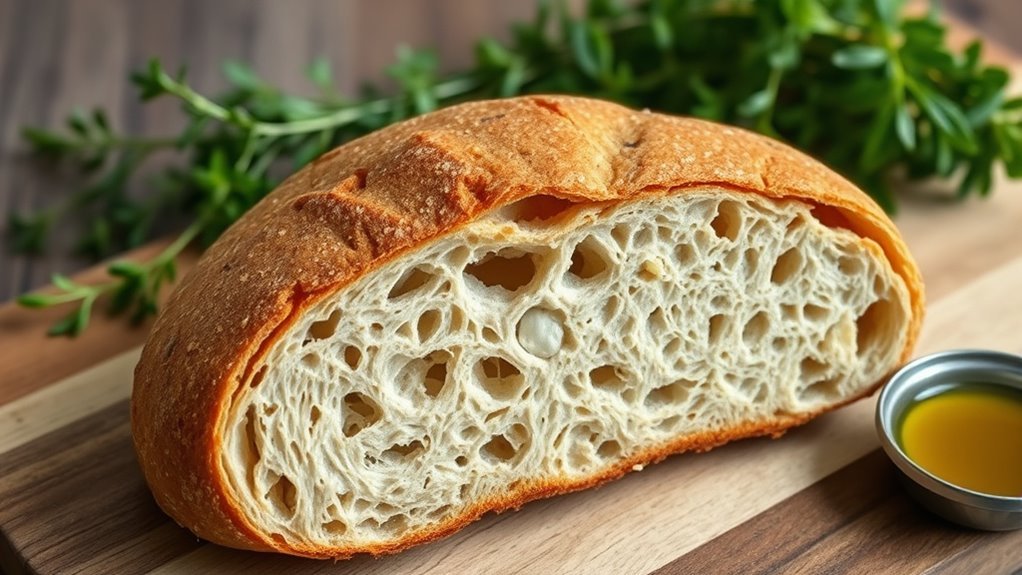You can eat sourdough bread on keto, but with caution. While it offers a lower glycemic index than regular bread and around 15 grams of carbs per slice, you’ll need to monitor your intake closely to stay within your carb limits. The fermentation process may lower its carbohydrate content and enhance digestibility, making it more favorable for those on low-carb diets. If you’re curious about maximizing its benefits while adhering to keto, there’s more to explore.
Understanding the Nutritional Profile of Sourdough Bread

While many people enjoy sourdough bread for its unique flavor and texture, understanding its nutritional profile is vital, especially if you’re following a ketogenic diet. Sourdough ingredients typically include flour, water, salt, and a natural starter, which can influence its carbohydrate content. In a nutritional comparison to regular bread, sourdough often has a lower glycemic index, making it a more favorable option for some. However, it still contains carbohydrates that can impact ketosis. A single slice of sourdough may have around 15 grams of carbs, which can add up quickly. Consequently, if you’re committed to maintaining a strict keto lifestyle, calculating your daily carb intake and considering portion sizes is essential for enjoying sourdough responsibly.
The Fermentation Process and Its Impact on Carbohydrates

Understanding the fermentation process is essential, as it greatly alters the carbohydrate content of sourdough bread. The fermentation benefits you gain from this process can lead to significant carbohydrate reduction, making sourdough a more keto-friendly option than conventional bread.
Fermentation significantly reduces carbohydrate content in sourdough, making it a more keto-friendly alternative to traditional bread.
- The presence of lactic acid bacteria helps break down complex carbohydrates.
- Fermentation increases the bioavailability of nutrients.
- Longer fermentation times can result in lower glycemic responses.
- Sourdough’s unique yeast cultures contribute to a distinct flavor profile.
- The digestion of fermented bread may be easier for some individuals.
Comparing Sourdough to Other Bread Options

When you compare sourdough bread to other bread options, it’s essential to reflect on not just the carbohydrate content but also the overall nutritional benefits. Sourdough, with its unique fermentation process, typically offers a lower glycemic index than many traditional bread options, making it easier on blood sugar levels. In bread comparisons, sourdough often contains beneficial probiotics and is easier to digest than commercial breads. However, sourdough alternatives, like almond flour or coconut flour bread, can provide even fewer carbs and higher fiber, making them appealing for those strictly adhering to keto. Ultimately, your choice should align with your nutritional goals and personal preferences, weighing not just carbs but overall health benefits.
Tips for Incorporating Sourdough Into a Keto Diet
Incorporating sourdough bread into a keto diet can be a thoughtful way to enjoy this beloved staple while maintaining your low-carb goals. Here are some tips to help you navigate this delicious option:
- Choose lower-carb sourdough alternatives, like those made with almond or coconut flour.
- Use sourdough in moderation to keep your carb intake in check.
- Pair your bread with keto-friendly toppings, such as avocado, cream cheese, or nut butter.
- Make sourdough toast for snacks to control portion sizes and enhance flavors.
- Experiment with sourdough recipes that incorporate other keto-friendly ingredients, like seeds and herbs.
With these strategies, you can enjoy sourdough while staying true to your keto lifestyle.
Potential Health Benefits of Sourdough
Sourdough bread offers several potential health benefits that could enhance your keto diet. Its fermentation process improves digestibility and may facilitate better nutrient absorption, making it a more favorable option. Additionally, sourdough typically has a lower glycemic index, which can help manage blood sugar levels.
Improved Digestibility Factors
While many people may think of bread as a dietary hurdle on a keto diet, sourdough offers improved digestibility factors that can enhance its health benefits. The fermentation process in sourdough activates digestive enzymes, breaking down gluten and phytic acid, which can help your gut better handle the bread. Here are some notable sourdough benefits related to digestibility:
- Increased availability of nutrients
- Reduced gluten sensitivity for some individuals
- Lower levels of phytic acid, enhancing mineral absorption
- Natural probiotics that support gut health
- Improved blood sugar response due to lower glycemic index
Enhanced Nutrient Absorption
When you choose sourdough bread, you’re not just indulging in a tasty option; you’re also enhancing your body’s ability to absorb essential nutrients. The fermentation process used in sourdough increases nutrient bioavailability, making vitamins and minerals more accessible for your body. This is particularly beneficial for those focused on gut health, as the probiotics in sourdough can support a balanced microbiome. Improved gut health can lead to better digestion and absorption of nutrients, allowing you to maximize the benefits of your diet. By opting for sourdough, you’re not only satisfying your cravings but also empowering your body to utilize crucial nutrients more efficiently, promoting overall well-being and vitality in your lifestyle.
Lower Glycemic Index
One significant advantage of sourdough bread is its lower glycemic index compared to traditional bread varieties. This means that when you eat sourdough, it leads to a more gradual increase in blood sugar levels, reducing the glycemic response. This can be beneficial for those monitoring their carbohydrate intake, like on a keto diet. Here are some key points to take into account:
- Sourdough fermentation reduces carbohydrate content.
- Beneficial bacteria in sourdough improve digestion.
- The lower glycemic index may promote better satiety.
- It may help stabilize energy levels throughout the day.
- Sourdough’s unique composition supports gut health.
Delicious Low-Carb Alternatives to Sourdough Bread
If you’re looking for low-carb alternatives to sourdough bread, several options can satisfy your cravings without derailing your keto diet. Almond flour bread, for instance, offers a nutty flavor and a texture that mimics traditional bread, while cloud bread provides a light and airy option that’s easy to make. Additionally, cauliflower breadsticks serve as a versatile base for various toppings, making them a delicious and healthy substitute.
Almond Flour Bread
While sourdough bread is often celebrated for its tangy flavor and artisanal qualities, those following a keto diet may seek alternatives that align better with their low-carb lifestyle. Almond flour bread is an excellent choice, offering several almond flour benefits that appeal to keto bakers.
- Low in carbohydrates
- High in healthy fats
- Rich in protein
- Packed with vitamins and minerals
- Gluten-free option
Cloud Bread Recipe
Cloud bread has emerged as a popular low-carb alternative that meets the needs of those on a keto diet, particularly for those missing the texture of traditional bread. This innovative recipe offers significant cloud bread benefits, including minimal carbohydrates and a high protein content, making it an excellent choice for maintaining ketosis. You can easily customize your cloud bread with various ingredients, leading to exciting cloud bread variations. For instance, adding herbs or spices can enhance flavor, while incorporating cheese can create a richer texture. Experimenting with different toppings can also satisfy your cravings without compromising your diet. With its versatility and nutritional profile, cloud bread allows for creative freedom while staying committed to your keto lifestyle.
Cauliflower Breadsticks
For those seeking additional low-carb bread alternatives, cauliflower breadsticks present a delicious option that captures the essence of traditional bread without the high carbohydrate content. These sticks are not only versatile but also packed with cauliflower benefits, making them a smart choice for your keto lifestyle.
Consider these aspects:
- Low in carbs: Perfect for keeping your macros in check.
- High in fiber: Supports digestive health and keeps you full.
- Easy to make: Simple low carb recipes that fit into any meal prep.
- Customizable: Add herbs, cheese, or spices to enhance flavor.
- Nutritious: Rich in vitamins C and K, promoting overall health.
Incorporating cauliflower breadsticks into your diet can satisfy cravings while adhering to your low-carb goals.
1. Can I eat sourdough bread on a keto diet?
While traditional sourdough bread is made from wheat flour, which is high in carbohydrates, there are alternatives available that can fit into a ketogenic diet. Some brands offer low-carb sourdough breads made with almond flour or coconut flour. Always check the nutritional label to ensure the bread fits your daily carb limit.
2. What is the carbohydrate content of traditional sourdough bread?
Traditional sourdough bread typically contains about 15-20 grams of carbohydrates per slice. This amount can vary depending on the recipe and ingredients used. For those on a strict keto diet, which generally limits daily carbohydrate intake to 20-50 grams, consuming traditional sourdough bread may hinder your progress.
3. Are there low-carb alternatives to sourdough bread?
Yes, there are several low-carb alternatives to traditional sourdough bread. Look for breads made from almond flour, coconut flour, or other low-carb ingredients. Many health food stores and online retailers now offer keto-friendly sourdough options that significantly reduce carbohydrate content while maintaining a similar taste and texture.
4. Can I make sourdough bread suitable for a keto diet at home?
Yes, you can make keto-friendly sourdough bread at home using low-carb flours like almond flour or coconut flour. There are many recipes available that utilize these ingredients while still incorporating the sourdough fermentation process, which gives the bread its unique flavor. Experimenting with different recipes can help you find one that suits your taste and dietary needs.
5. What are the health benefits of sourdough bread compared to regular bread?
Sourdough bread is often considered healthier than regular bread due to its unique fermentation process, which can enhance the bioavailability of nutrients and make it easier to digest. The fermentation also lowers the bread’s glycemic index, which can help with blood sugar control. However, for those on a keto diet, these benefits may be less relevant if the bread contains high levels of carbohydrates.
References
- https://www.ncbi.nlm.nih.gov/pmc/articles/PMC6541090/
- https://www.healthline.com/nutrition/keto-diet
- https://www.webmd.com/diet/obesity/ss/slideshow-keto-diet
- https://www.mayoclinic.org/healthy-lifestyle/nutrition-and-healthy-eating/in-depth/keto-diet/art-20460213
- https://www.verywellfit.com/what-is-the-keto-diet-5111969
- https://www.sciencedirect.com/science/article/pii/S2212267217301959
- https://www.washingtonpost.com/lifestyle/wellness/what-is-the-keto-diet-and-how-does-it-work/2019/01/02/4f1c4c8a-0f34-11e9-9122-82e98f91ee6f_story.html


